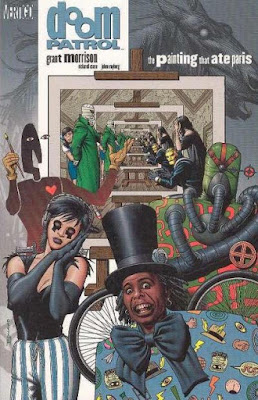Thoughts, reviews, rants, laments, and general chatting about the wonderful world(s) of comic books.
Oct 27, 2016
The 40 Years of Comics Project - The Weekly Graphic Novel: Week 27 - Doom Patrol: The Painting That Ate Paris, 2004
If Grant Morrison's run on the Doom Patrol is remembered for nothing else, a vast unlikelihood as far as I'm concerned, it will be remembered for the first story in this collection, "The Painting That Ate Paris." Over the course of the previous volume, strange asides featuring a shadowy figure recruiting superbeings "in the name of Brotherhood" have dropped hints that the DPs nemesis organization, The Brotherhood of Evil, were set to make a return.
Such is not quite the case.
Mr. Nobody and the Brotherhood of Dada are one of the great creations in superherodom. A team dedicated to the proliferation of chaos and nonsense, to freeing humanity from the shackles of control, whether we want it or not. Really, to butcher the cliche surrounding Nolan's Dark Knight, they're not the heroes we want, but I think they're the heroes we need. A couple of volumes from now, the "Vote for Nobody" campaign gets into full swing - I'm torn between supporting him or Cthulhu. Tough choice.
The "Painting" storyline makes me wish that I'd taken at least an introductory Art History course in my undergrad. Each level of the painting that Paris is sucked into (yep, the title is actually a pretty literal description of what happens) is based on a particular movement in recent artistic history. The surrealist layer is pretty easy to recognize, and given the nature of the series, makes the most sense as the place where a lot of the very important action of the story occurs, but I don't know nearly enough about Impressionism or Futurism to really get the references, both visual and linguistic. To me, this is yet another feather in Morrison's cap, another reason to consider him to be one of the great writers in the language, not just in comics. A good writer researches, embeds themselves in the minutia of a subject before attempting to translate it to the page. It give Plato's contentions about the poet a run for its money. In Republic, Plato casts the poets out of the perfect society because they bring no real expertise to the society. They simply describe things that other people are more adept at. But a writer who does this level of research (and I'm certainly not claiming Morrison is the only one) does, to a certain extent, become an expert. And, in giving us a small, narratively-bound glimpse of this subject, allows their readers to gain a modicum of this knowledge too.
Oh, and after that story (and the defeat of Extinction, the Fifth Horseman of the Apocalypse), the team is called upon to deal with the menace of the De-Creator, the shadow cast by God when he said "Let There Be Light." Contesting the machinations of the Cult of the Unread Book, the team, along with John Constantine wannabe Willoughby Kipling, don't actually quite beat the menace. They just slow its destruction of reality down so much that we don't actually things disappearing, little by little.
Rounding out this volume, fittingly, is the return of two members of the original Brotherhood of Evil, M. Mallah and The Brain. In a strange little tale of the dialogues that go on between mind and body, a callback to the poetry of the 17th century, Mallah and The Brain finally realize their true feelings for one another, though slightly too late. This story also features what I can only imagine is the sole instance in superhero comics of face-to-face combat between two disembodied brains in jars.
Seriously, why are you not reading this book right now? Onward!
Subscribe to:
Post Comments (Atom)

No comments:
Post a Comment